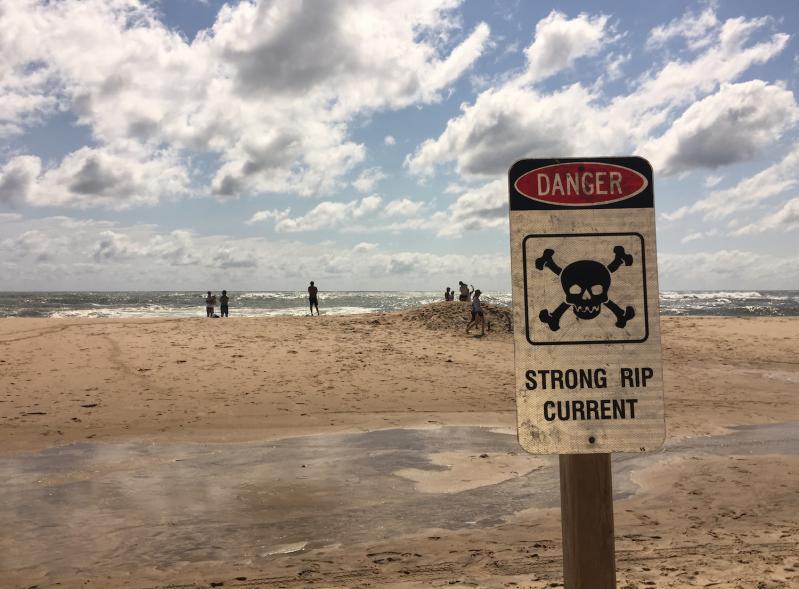The Atlantic hurricane season officially started on Sunday, and with predictions of an above-average year amid substantial staffing and budget cuts to the Federal Emergency Management Agency and the National Oceanic and Atmospheric Administration, East Hampton Town, like the entire East Coast, enters a perilous six-month span.
NOAA’s forecast for the season, for which it asserts 70-percent confidence, includes 13 to 19 named storms, six to 10 of them predicted to become hurricanes, and three to five of those major hurricanes. A named storm has winds of 39 miles per hour or more, while a hurricane is characterized by winds of 74 m.p.h. or higher. A major hurricane would see winds of 111 m.p.h. or more.
Sea surface temperatures in the North Atlantic have been significantly warmer than average, experiencing a “marine heatwave” of record or near-record warmth since March 2023. As warm water provides energy to fuel hurricanes, warmer ocean temperatures can contribute to a more active hurricane season.
Before leaving Washington, D.C., last week, Elon Musk, who led the Trump administration’s Department of Government Efficiency, mandated cuts of around 2,000 FEMA staff, raising concerns about its readiness in disaster response. The New York Times reported last month that FEMA had 6,588 trained staff members available to deploy to disasters at the start of the 2017 hurricane season. As of May 21, it had 1,952, about a 70-percent reduction.
NOAA’s staff is also down by more than 2,200, or around 20 percent of its work force, including hundreds of National Weather Service employees. Many of the cuts were to NOAA’s climate change research activities. At least eight of the National Weather Service offices are at present unable to operate around the clock, impacting weather forecasting, and a quarter of the nation’s weather forecast offices have lost their meteorologist in charge.
Underscoring the uncertainty surrounding federal emergency preparedness and response as hurricane season gets underway, Cameron Hamilton, who was FEMA’s acting administrator, was relieved of his duties in May after just a few months on the job, following testimony before a congressional committee in which he said that FEMA should not be eliminated. He was replaced by David Richardson, who has no experience managing natural disasters. FEMA staffers recently told news organizations that Mr. Richardson did not know that hurricane season existed, though that is apparently inaccurate.
President Trump has proposed eliminating FEMA entirely and transferring its disaster response activities to states. Last month, Gov. Kathy Hochul announced Triple Three Triple One, an emergency and weather alert system, as part of New York’s Hurricane Preparedness Week. State residents can text 333111 with their county of residence in the message to receive real-time emergency and weather alerts and updates to their phones. The state has also begun distribution of $15 million in flood-related equipment to counties and specialized training for emergency operations personnel.
In East Hampton, Councilman Tom Flight said on Tuesday that a “tabletop walk-through” of hurricane preparedness and the scheduling of a presentation by Suffolk County Fire, Rescue, and Emergency Services are still pending, as are updates to the town’s online Emergency Preparedness Department presence. At Tuesday’s town board meeting he expressed concern about “ensuring we have adequate resources in that department to get these things done.”
The town’s emergency preparedness committee has been reviewing FEMA emergency plans to identify areas where the town may need to expend resources, Mr. Flight said. (FEMA reviews state and local plans to ensure compliance with federal requirements.) The town, he said, has not conducted a “stress test” of emergency preparedness “in quite some time.”
It is essential for residents to have supplies on hand adequate for the number of people in the household, he said. Residents should also take advantage of the town and the Police Department’s social media, and sign up for alerts on the town’s website. Told that emails to the address listed on the Emergency Preparedness Department page on the town’s website were returned as undeliverable, he said that he would notify the Information Technology Department.
Uncertainty at the federal level notwithstanding, “I feel confident in the people we have here,” Mr. Flight said, among them many who serve on a volunteer basis. “We have amazing emergency departments, be it fire districts, the Police Department, all enforcement agencies — Marine Patrol, Ordinance [Enforcement]. A lot of people in this community, when emergencies happen, they step up.”




